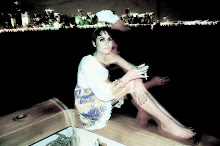Corned, like mice, in the cubby of the room my professor and I spoke of my pursuit for the plotless novel. We have been meeting for a year and a half now, but she probably knows more about my interior thought pattern—the struggles and triumphs I have faced as a young woman wanting desperately to write her life, to uncover treasures deep beneath the mess of a life—than anyone, ever. And with that said, she may believe in my potential for literary success more than anyone as well. She is a brilliant woman with a fragile figure and focus all her own. I believe she has a remarkable gift for finding the passages in hundred pages of text that are marked by beauty, and could easily have disappeared between the thousands of letters crawling across pages. Recently I found out that she was valedictorian, not to mention her study at Columbia and Oxford and her closet friend Derrida. Her mystique fascinates me. From our time together, there is no doubt I have given her access to my obsessions, the themes of my thoughts and alas, the secrets that reveal themselves—barely at all—on the last layer of my text. And the more she shares with me about myself, the more I believe she knows the story I will write—that I want to write, but have avoided—before I realize it is what I am writing.
When I read my sister a new piece of writing—again spontaneous, raw, touched only once and created instinctively (?) impulsively (?)—I had not told her what my professor had told me a few days before; that she had no uncertainty that I can write stories. She said that as of now I write deeper into the story—what the story means once it is dissected, evaluated and internalized—and she believed that because I always start after the story and apart from the actions of the event, I will be able to write a better, more successful narrative because I know what it is all about—what the character feels and why.
My sister finally spoke to me candidly. Saying that in the beginning of the piece I wrote her, she thought that I was using a voice that could be successfully used for my longer fictions/potential novel. But then she said the language became mentally exhaustive when I read it to her. This is something I was told last spring—that stories that were personal read like philosophical texts and because of that there was no space between the sentences that the reader could come up for a breath. This, too, ultimately frustrates me and was a challenge I worked on this summer in my writing course. A voice that was more natural and inviting, that in a way was more real to fiction. But then my sister said just what my professor had, but in words that hit home more, and were in a way more enticing for me as a writer. She made me realize that these texts that I have been writing are like a detailed outline, research and interview of what the character felt at every angle—an intense probing as to see what will motivate the character to act. I think that is what my work has been, a mental anguish to understand and know the psychology and philosophy of characters. It is what my blogs and meditative writing has been for—the larger story, the actual story, the story I am bound to write. So often I wish I could hand over everything I have written—every fragment—every post—every digression from action—and be told what it all has been truly about, what is the story I need to tell.
i have filled innumerable notebooks with phrases to be used when i have found the true story, the one story to which all these phrases refer. but i have never yet found that story. and i begin to ask, are there stories? -the waves, virginia woolf.









No comments:
Post a Comment